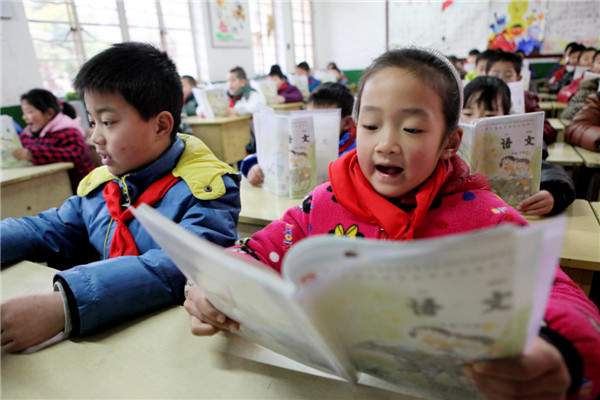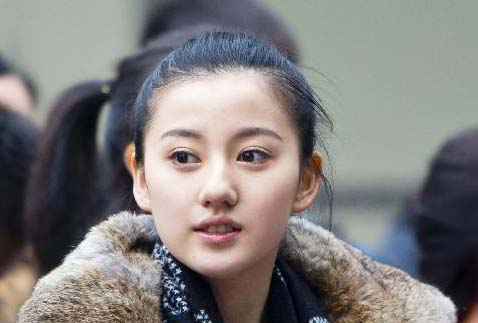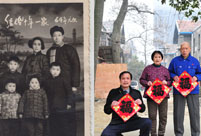 |
| First graders in Rong'an county, Liuzhou city of South China's Guangxi province, in class on Feb 17, 2014. (Xinhua/Huang Xiaobang) |
Outside Beijing
Far from the capital, township governments in Hunan province are responsible for hiring art, music and physical education teachers in rural areas, meaning that they are employed by the township rather than a specific school.
In other regions, such as the central metropolis of Chongqing, the idea is also under consideration.
During the municipality's People's Political Consultative Conference in January, Mu Yanlin, deputy director of Chongqing's education commission, confirmed that work was being undertaken to formulate the details of the mechanism.
In addition, an education alliance has been established among nine schools in Chongqing, including one in a rural area, and at Chongqing Shuren Primary School, a key primary in the municipality.
Liu Hongbin, deputy principal at Chongqing Shuren, said her teachers will rotate to rural schools within the municipality for one or two years, during which time they will receive a higher wage from the district education authority. They will be expected to hold occasional seminars to exchange ideas about educational philosophy and tips on work plans and teaching methods. In one district, Chongqing Shuren also cooperates with other schools, whose teachers visit every week to see how classes are conducted and to discuss teaching methods.
Teachers' welfare
Although some principals agreed that the rotation mechanism would be an effective way of boosting educational equality, many still have concerns.
In addition to the effect on quality, Liu was concerned about the teachers' welfare.
"At our school, a teacher is responsible for a class for the entire six years, which means a solid relationship is established between teachers and students," she said. "The rotation mechanism may adversely affect that consistency and result in a negative effect on the students' studies."
Zhang Ting, a high school teacher from a key high school in Beijing, echoed Liu's views, saying that if she were rotated, she would need time to adapt to a new environment.
"I have to take time to understand my new students. It wouldn't help if I knew little about them, and it could even be counterproductive," she said. "Being rotated around schools would make it difficult for me to work out where I belong and which school I'm serving. In addition, teachers in different schools will receive different subsidies and benefits."
Huang Shaobing, vice-president of Wushan High School in Chongqing, said that few of his teachers are willing to work in the rural areas.
"It's hard to push the rotation idea, partly because the facilities at rural schools are not comparable with those in urban areas," he said.
Tian also expressed some reservations. "We should develop an overriding plan for education, not just a simple teacher exchange. If the teachers are unable to agree on an education philosophy, blind rotation won't bear fruit.
 |  |
 Most gorgeous female celebs in Chi-pao
Most gorgeous female celebs in Chi-pao Second round of test kicks off at Beijing Film Academy
Second round of test kicks off at Beijing Film Academy Ancient Qiang people had vertically grown teeth
Ancient Qiang people had vertically grown teeth Top 10 Chinese youth’s favorite seaside destinations
Top 10 Chinese youth’s favorite seaside destinations Traditional Tibetan clothing tailors
Traditional Tibetan clothing tailors In photos: Unveiling Taishan station
In photos: Unveiling Taishan station Beautiful moments of family reunion
Beautiful moments of family reunion 10 Valentine's Day ideas for couples
10 Valentine's Day ideas for couples Let's get married today!
Let's get married today! Chinese warplanes C919 to appear at Singapore Airshow 2014
Chinese warplanes C919 to appear at Singapore Airshow 2014 Ruins of Shang Dynasty's structure unearthed in Shaanxi
Ruins of Shang Dynasty's structure unearthed in Shaanxi  Intercity high speed train in operation
Intercity high speed train in operation Severe coldness freezes large parts of China
Severe coldness freezes large parts of China  Beautiful moments of Sochi
Beautiful moments of Sochi  It's not just performing this year
It's not just performing this yearDay|Week|Month